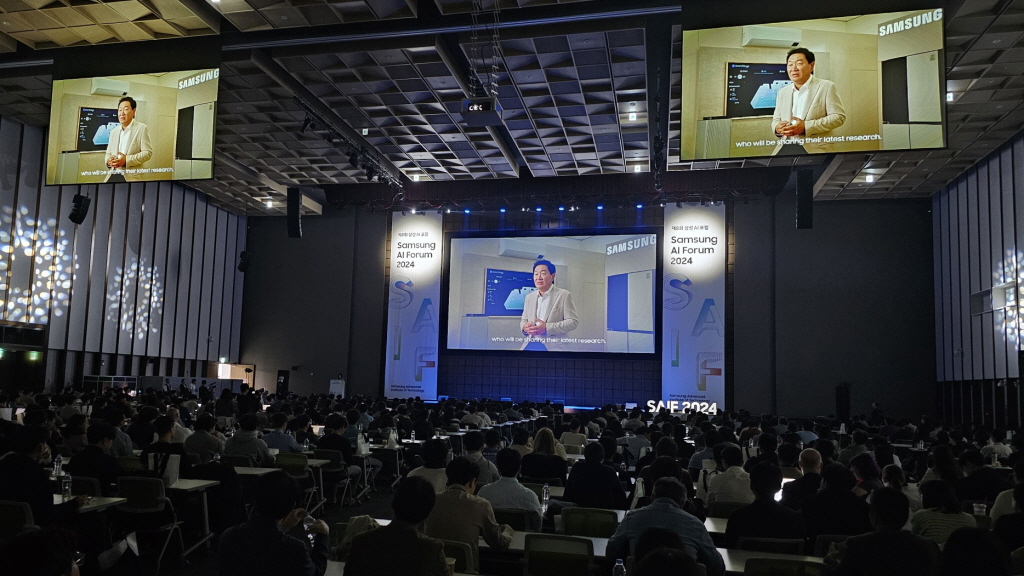삼성전자가 수원컨벤션센터 및 삼성전자 서울 R&D 캠퍼스에서 삼성전자 SAIT(Samsung Advanced Institute of Technology) 주관으로 ‘삼성 AI 포럼 2024’를 개최하며 글로벌 AI 석학들과 AI의 미래에 대해 논의했다. 이 자리에서 한종희 삼성전자 대표이사 부회장은 AI를 더 책임감 있게 사용할 수 있을지가 갈수록 중요해진다며 삼성전자가 보다 효율적이고 지속 가능한 AI 생태계를 구축하는데 책임을 다할 것이라고 밝혔다.

▲삼성전자 한종희 대표이사 부회장이 개회사를 하고 있다.
‘삼성 AI 포럼 2024’, 국내외 석학 초청 지속 가능 혁신 방안 모색
벤지오 교수, “AI 안전 대중도 AI 현재 상태·미래 정확히 이해해야”
한종희 삼성전자 대표이사 부회장이 삼성 AI 포럼에서 AI를 더 책임감 있게 사용할 수 있을지가 갈수록 중요해진다며 삼성전자가 보다 효율적이고 지속 가능한 AI 생태계를 구축하는데 책임을 다할 것이라고 밝혔다.
삼성전자는 4∼5일 이틀간 수원컨벤션센터에서 삼성전자 SAIT(Samsung Advanced Institute of Technology) 주관으로 ‘삼성 AI 포럼 2024’를 개최하며 글로벌 AI 석학들과 AI의 미래에 대해 논의했다.
올해로 8회째를 맞는 삼성 AI 포럼은 세계적으로 저명한 인공지능(Artificial Intelligence)과 컴퓨터 공학(Computer Engineering) 분야 석학과 전문가들을 초청해 최신 연구 성과를 공유하고 향후 연구 방향을 모색하는 기술 교류의 장이다.
이번 포럼에는 △딥러닝 분야의 세계적 권위자인 요슈아 벤지오(Yoshua Bengio) 캐나다 몬트리올대 교수 △얀 르쿤(Yann LeCun) 메타 수석 AI 과학자 겸 미국 뉴욕대 교수 △지식 그래프(Knowledge graph) 분야 세계적 권위자인 이안 호록스(Ian Horrocks) 영국 옥스퍼드대 교수 등 글로벌 AI 석학들이 기조 강연에 나섰다.
삼성전자 한종희 대표이사 부회장은 개회사에서 “AI는 놀라운 속도로 우리의 삶을 변화시키고 있고 더욱 강력해짐에 따라 어떻게 AI를 더 책임감 있게 사용할 수 있을지가 갈수록 중요해진다”며 “삼성전자는 보다 효율적이고 지속 가능한 AI생태계를 구축하는데 책임을 다할 것”이라고 밝혔다.
1일차 포럼은 인공지능과 반도체 기술을 활용한 지속 가능한 혁신 방안 모색(Sustainable Innovation with AI and Semiconductors)을 주제로 진행됐다.
참석자들은 포럼에서 차세대 반도체 개발 및 생산 역량을 강화할 수 있는 AI와 CE(Computer Engineering) 기술 연구 성과를 공유하고 향후 발전 방향에 대해 논의했다.
캐나다 몬트리올 대학교의 요수아 벤지오 교수는 AI 안전을 위한 베이지안 오라클(Bayesian Oracles for AI Safety)이라는 주제의 기조 강연에서 보다 안전하고 신뢰성 높은 AI 시스템 구축을 강조했다.
베이지안 오라클(Bayesian Oracles)은 고급 통계 모델인 베이지안(Bayesian) 방법론을 이용하여 정보를 수집·분석하는 역할 및 새로운 정보에 따른 기존 지식 업데이트를 통한 예측력을 향상시키는 역할을 수행한다. 이에 따라 복잡하고 변동성이 큰 환경에서의 효과적인 의사결정을 지원할 수 있다.
벤지오 교수는 대규모 노동 시장 영향, AI를 이용한 해킹, 슈퍼 인텔리전스의 출현 등 AI의 미래 위험성과 함께 AI의 성능이 다양한 분야에서 인간 수준을 넘어섰다는 연구 결과를 소개하며, AI 안전을 위해서는 정책 입안자들은 물론 대중들도 AI의 현재 상태와 미래에 대해 정확히 이해하고 있어야 한다고 밝혔다.
벤지오 교수는 AI의 안전성을 확보하기 위해 △AI가 위험한 행동을 하지 않도록 사전에 안전한 AI 설계가 이뤄지고 △AI의 행동과 목표를 인간과 일치시킬 필요가 있으며 △국가/기업간 AI 경쟁에 더 많은 조정과 협력이 필요하다고 역설했다.
2018년 튜링상 수상자로 세계적인 AI 석학으로 손꼽히는 벤지오 교수는 2017년 제1회부터 삼성 AI 포럼에 꾸준히 참석했으며 2020년부터는 삼성 AI Professor로 활동하며 삼성전자와 산학협력 등을 진행하고 있다.
벤지오 교수와 함께 2018년 튜링상을 수상한 얀 르쿤 교수는 기조 강연을 통해 현 거대언어모델(LLM)의 수준과 한계를 설명하고, 기계가 인간의 지능 수준에 도달하기 위해서는 추가적인 기술 혁신이 필요함을 강조했다.
기술 세션에서는 AMD CTO인 조세프 마크리(Joseph Macri) 부사장이 어디에나 존재하는 AI를 주제로 AMD의 AI 솔루션을 소개하고 AI 플랫폼과 협업의 중요성, AMD의 강점 등을 피력했다.
이와 함께 삼성전자 SAIT 최영상 마스터가 강연자들과 함께 AI 기술 트렌드 및 반도체 AI 방향성을 토의하는 시간을 가졌다.
이날 발표된 삼성 AI 연구자상(Samsung AI Researcher of the Year)에는 수란 송(Shuran Song) 미국 스탠퍼드대 교수 등 5명이 선정됐고, 수상자들의 현장 강연도 진행됐다.
수란 송 교수는 로보틱스 전반에 AI를 활용한 연구에 집중하고 있으며, 3D 모델링의 인식 및 추론 알고리즘 개발에 기여한 점이 높은 평가를 받았다.
2일차 포럼은 모두의 일상생활을 위한 디바이스 AI(Device AI for Our Daily Lives)를 주제로 삼성전자 서울 R&D 캠퍼스에서 진행됐다.
삼성전자 삼성리서치 김대현 글로벌 AI 센터장(부사장)은 환영사를 통해 생성형 AI 기술 발전에 따른 디바이스 AI의 일상 변화가 더욱 가속화되고 있다며, 이번 포럼이 다가오는 AI 시대의 새로운 가능성을 논의하고 공유하는 장이 되기를 바란다고 말했다.
옥스퍼드 시멘틱 테크놀로지스(OST, Oxford Semantic Technologies)의 공동 설립자인 영국 옥스퍼드대 이안 호록스(Ian Horrocks) 교수는 지식 그래프를 적용한 개인화 AI 서비스 기술 이라는 주제로 키노트 발표를 맡았다.
삼성전자는 지난 7월 세계 최고 수준의 지식 그래프 원천 기술을 보유하고 있는 OST사를 인수했다.
호록스 교수는 지식 그래프의 중요성과 지식 그래프가 사람의 지식 기억 및 회상 방식과 유사하게 데이터를 저장, 처리하는 방식을 설명했다.
또한 지식 그래프 시스템의 특징을 잘 반영하는 검색, 추천 등의 주요 활용 사례를 소개하고, 유연한 데이터 모델과 논리적 추론을 바탕으로 한 사용자 맞춤형 서비스 구현 방안을 제시해 참석자들의 이목을 끌었다.
삼성전자 SAIT 최창규 AI 리서치센터장 (부사장)은 과학을 위한 AI 주제 발표에서 AI와 반도체 기술은 우리의 삶을 개선할 뿐만 아니라 개발 시간과 비용을 줄이는 등 과학 분야에서도 매우 중요하다면서 특히 실험 데이터가 부족하거나 물질 합성이 어려운 경우에 AI가 큰 도움이 된다고 밝혔다.
삼성리서치 이해준 마스터는 거대언어모델의 효율적인 학습을 위해서는 고품질의 데이터, 효율적인 아키텍처, 안정된 훈련 기법 등이 필요하다며, 이를 통해 비용과 성능을 동시에 개선할 수 있음을 설명했다.
또한 이전 모델 재사용을 통해 새로운 모델 학습의 효율과 성능을 개선할 수 있고, 이런 방법들이 언어 모델 개발에 있어 중요하게 고려해야 할 요소라고 강조했다.
